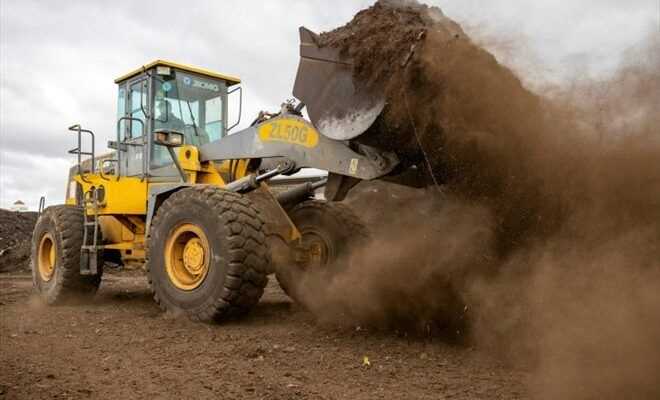Workers in a factory of the Eléphant Vert group, specializing in the recovery of organic waste, in Meknes, Morocco, December 9, 2021 (AFP / FADEL SENNA)
“Nothing is lost here, everything is transformed”, says Mohamed proudly, crumbling a handful of compost produced in Morocco by a Swiss company specializing in the recovery of organic waste. An innovation in the kingdom where recycling however remains incomplete.
It is in the “Agropolis” of Meknes (center), an industrial zone dedicated to agro-industry, that the group Eléphant Vert (EV) installed in 2012 its largest factory in Africa with about fifty employees. and an annual production capacity of 40,000 tonnes of compost as well as organic fertilizers.
At the entrance, modern offices with grass-green walls decorated with graffiti, like in a start-up in Casablanca.
But once on the production site, a change of scenery: mountains of sawdust, crates and fruit tree branches cover the storage platform.
The roar of trucks, which transport the manure and of the excavators which aerate the compost, fills the space.
– “Healthy agriculture” –
“After the mixture of organic matter rich in carbon and manure from non-industrial farming, rich in nitrogen, it is nature that operates!”, Explained to AFP Mohamed El Kabous, production manager at EV.
Here, we do not use household organic waste: “It is very expensive because the culture of (selective) sorting is almost non-existent in Morocco”, he explains.

Workers in a factory of the Eléphant Vert group, specializing in the recovery of organic waste, in Meknes, Morocco, December 9, 2021 (AFP / FADEL SENNA)
The waste comes from surrounding farms: factories working with wood, cooperatives that manufacture essential oils.
The open-air fermentation site, which takes four months to produce compost, does not emit any foul odors because wood is an absorbent material.
On the contrary, we smell the smell of fresh earth. “I would even say that it smells of + zammita” (famous Moroccan cake), jokes Mr. El Kabous.
In addition to compost, Green Elephant produces fertilizers by adding phosphorus or potash.
Its products flow mainly on the Moroccan market for the benefit of large farms – whose soils have become impoverished due to the massive use of chemical fertilizers – and small organic farms.

A worker in a factory of the Eléphant Vert group, specializing in the recovery of organic waste, in Meknes, Morocco, December 9, 2021 (AFP / FADEL SENNA)
“Demand is increasing for farmers who, keen to make their land sustainable, have become aware of the need to opt for healthy and sustainable agriculture,” said the official.
If the recycling of organic products seems to take off, with other initiatives such as a major treatment and recovery center for the French giant Suez in Meknes, Morocco is far from ensuring efficient recovery of its waste.
– “Technocratic strategies” –
Like the recycling rate of household waste which stood at only 6% in 2015 (last reference year), i.e. 420,000 tonnes out of a total of 7 million tonnes per year, the ministry told AFP. Energy Transition and Sustainable Development.

A backhoe loader transports organic waste to a factory of the Eléphant Vert group, in Meknes, Morocco, on December 9, 2021 (AFP / FADEL SENNA)
If industrial waste is partly recycled (at 12%, especially plastic, paper / cardboard and metals), as elsewhere in the Maghreb, most of the household waste is buried.
And this despite a plethora of projects including a national waste treatment program which provided for a recycling rate of 20% in 2022. An objective pushed back to 2030.
“These strategies crafted by technocrats in Rabat lead nowhere because they are modeled on European models, the antipodes of Moroccan habits”, explains to AFP Mustapha Brakez, an expert in urban waste management.
He points out, for example, that in Morocco, nearly 80% of household waste is organic against less than 30% in Europe.
The kingdom has only 26 landfill and recovery centers, although 66 illegal dumps have been rehabilitated so far, according to official data.
“All efforts have been focused on treatment (mostly via landfill, editor’s note) without providing solutions to the collection,” laments Mr. Brakez.
For him, waste management in the country is “a time bomb”: “We will create more landfills, namely storage spaces, without solving the problem at the source”.
“It is essential to think about a global system which goes from sorting at household level to recovery centers”, pleads the specialist.
© 2021 AFP
Did you like this article ? Share it with your friends with the buttons below.




